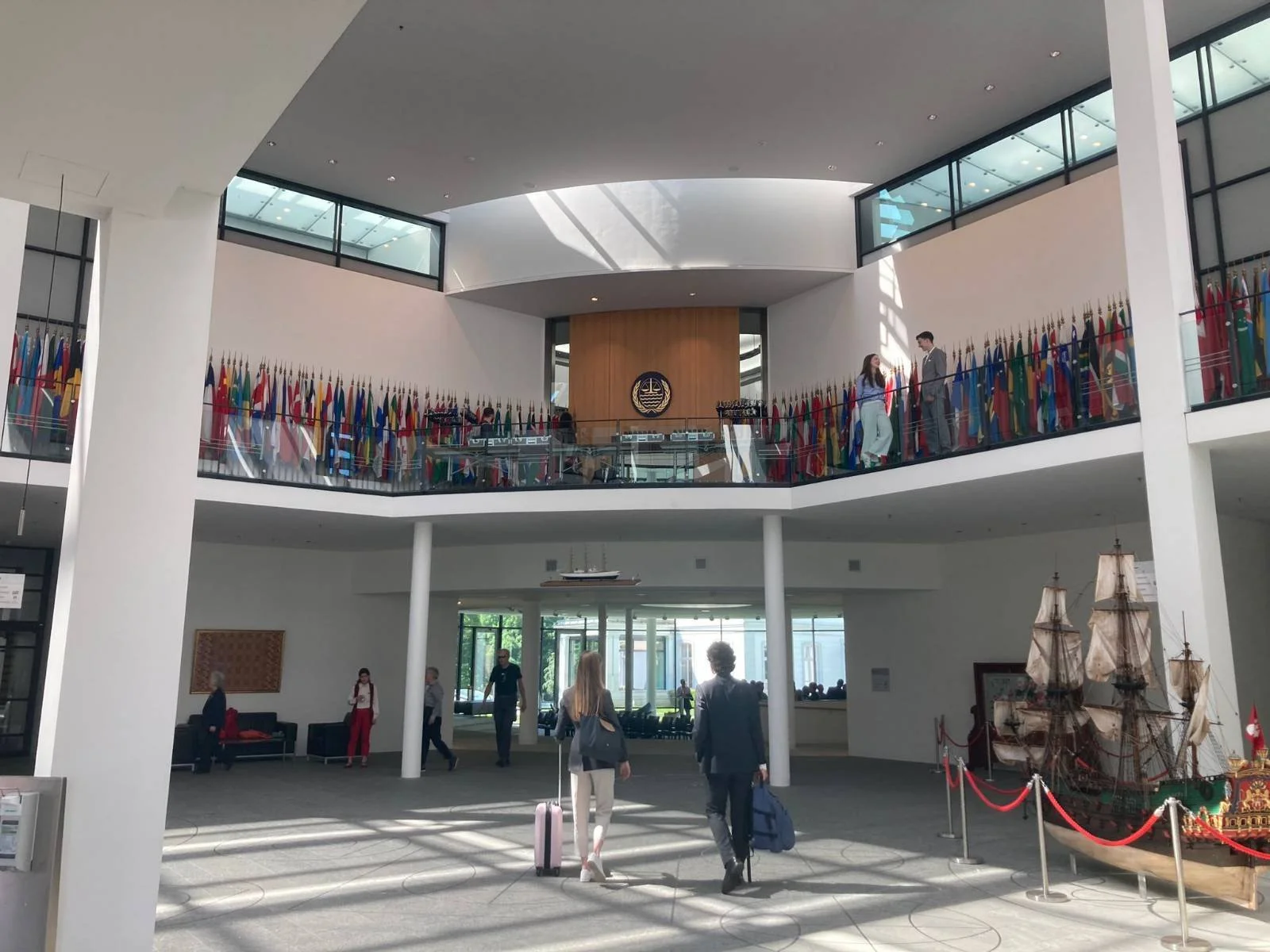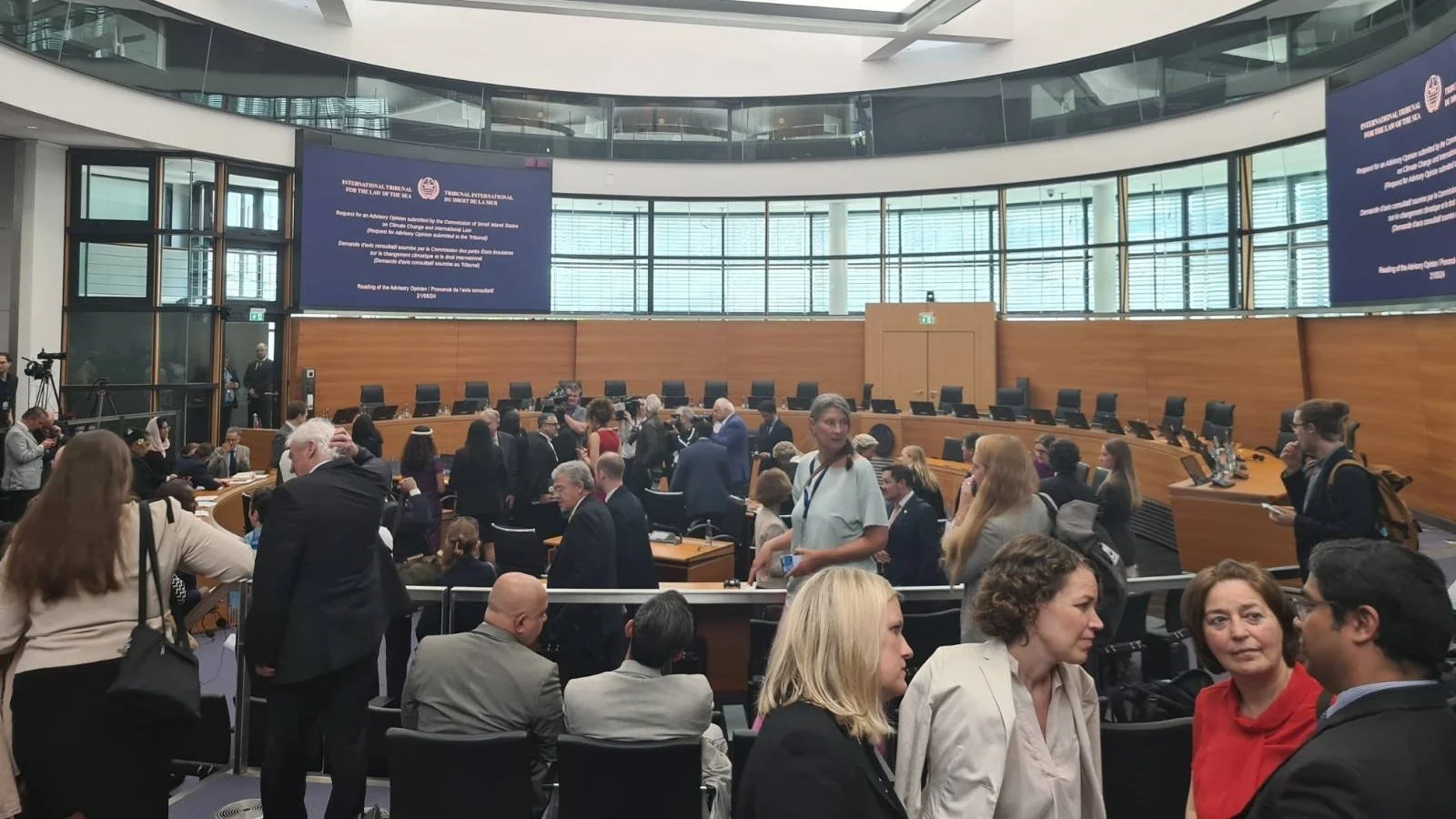Huge moment for small island states and marine protection: OG responds
Last month marked a pivotal moment in climate justice as the long-anticipated advisory opinion was handed down from the International Tribunal for the Law of the Sea (ITLOS). We round up our team’s initial reactions.
The recent ITLOS hearings in Hamburg
This is highly significant for international climate change law, and a historic marker for small island states. It was these States that started proceedings by forming the Commission of Small Island States on Climate Change and International Law (COSIS) and asking ITLOS to issue an opinion clarifying States’ obligations to protect and preserve the marine environment from harmful climate change impacts under the UN Convention of the Law of the Sea (UNCLOS).
COSIS represents the interests of low-lying, small island states. These are the countries that have contributed so little to climate change and yet are bearing some of its most immediate and devastating consequences.
It can’t be overstated how monumental the opinion turned out to be – not only for small island states, but also for vulnerable communities, the ocean environment and people everywhere.
Our Legal Assistant, Olivia Moyle, attended the readings in Hamburg. Here’s her reflection on the day itself:
“There was an immediate sense of gravity in the room, not least because the judges ruled so positively on legal obligations and principles Opportunity Green had included in its written statement to ITLOS. Following the reading, COSIS representatives spoke movingly on the interconnections between climate change and their livelihoods, what’s at stake if States don’t take their climate commitments seriously and the very little time we have to turn things around. This really brought home the implications the advisory opinion will have on States’ inaction; they can now be held to account under international law.”
What were the main outcomes of the ITLOS advisory opinion?
“The judges were clear that given the high risks of serious and irreversible harm to the marine environment, States’ obligations to address greenhouse gas emissions need to meet a very high standard, informed by the best available science and the 1.5°C temperature goal and timeline,” says our interim Legal Director, David Kay.
“This means it’s not enough to just rely on global efforts and international organisations. With sectors such as international shipping currently off course, States urgently need to put in place effective policies to meet these legal obligations.”
While we continue to look at the full detail of the opinion, here are David’s key takeaways:
The Tribunal unanimously found it had jurisdiction and exercised its discretion to issue the advisory opinion. This alone is a significant step and a credit to COSIS and their legal advisors who worked on the request.
The Tribunal referred to the authoritative scientific assessments of the Intergovernmental Panel on Climate Change (IPCC) – noting the drastic impacts of climate change on the ocean and that “climate change represents an existential threat and raises human rights concerns”.
Human-caused greenhouse gas (GHG) emissions fall within the definition of “pollution of the marine environment” and therefore States are subject to a wide-ranging set of obligations under UNCLOS to address GHG emissions.
States, individually or jointly, should take “all necessary measures” to prevent, reduce and control GHG emissions from any source. This is a stringent standard of due diligence, informed by the best available science and the 1.5°C temperature goal in particular.
States cannot necessarily discharge this obligation exclusively through participating in global efforts – States are also required to take individual actions as appropriate.
Obligations under UNCLOS are not satisfied simply by complying with the Paris Agreement.
States must also take “all necessary measures” to ensure that GHG emissions under their jurisdiction or control do not cause damage to other States and their environment. ITLOS interpreted “jurisdiction or control” broadly, encompassing public and private actors and gave as an example activities carried out on board ships or aircraft which are registered in that state.
A failure to comply with the obligation to take all necessary measures to mitigate GHG emissions engages international responsibility for the State in breach, leaving open the door to potential legal remedies and compensation.
States with greater capabilities must do more than States with less capabilities, and there are extensive obligations on States to cooperate and to provide assistance to developing States.
The obligation to protect and preserve the marine environment extends to adaptation and restoration.
People gathering at the readings of the advisory opinion
Opportunity Green’s ITLOS submission
Opportunity Green put forward a supporting submission to ITLOS urging the Tribunal to consider shipping emissions. “We are delighted to see that the Tribunal’s opinion aligns with many of the arguments made in our submission,” says David.
For international shipping, it is clear that all States should adopt regulations aligned with IMO standards at a minimum. And, if they are to comply with their general obligations to address climate impacts on the marine environment they need to go further.
While the IMO’s policies remain unaligned with 1.5°C, it is difficult to see how States’ international legal obligations under UNCLOS can be met. Therefore, States should increase ambition at the IMO and negotiate 1.5°C-aligned measures, or act unilaterally or regionally to meet their legal obligations.
What impact will this have in future?
This opinion is expected to have significant, far-reaching implications – not least, informing policy-making at the domestic and supranational level. This will be crucial at the IMO this September, says our Senior Shipping Manager, Ana Laranjeira:
“States will continue important negotiations around the ‘basket of measures’ that will support the delivery of the Revised GHG Strategy agreed last year. This advisory opinion should play a crucial influential role in these international negotiations, as the Tribunal has clarified States’ obligations under the law of the sea to protect our ocean from the impacts of anthropogenic climate change, including international shipping.”
The opinion is especially important as it is just the first of three advisory opinions on climate change to be released by international courts. Opinions from the International Court of Justice (ICJ) and the Inter-American Court of Human Rights (IActHR) are on their way too.
As our Legal Officer Isabela Keuschnigg, explains, the ITLOS opinion will set the scene for what is to come.
“With ongoing climate change cases around the world and three international advisory proceedings in the context of climate change, this is a pivotal moment in the pursuit of climate justice. The Tribunal has shown the significance of our ocean in tackling the climate crisis and, crucially, highlighted the role of the law of the sea which clearly calls on States to take all necessary measures to stop the pollution of our seas from anthropogenic climate change.”










